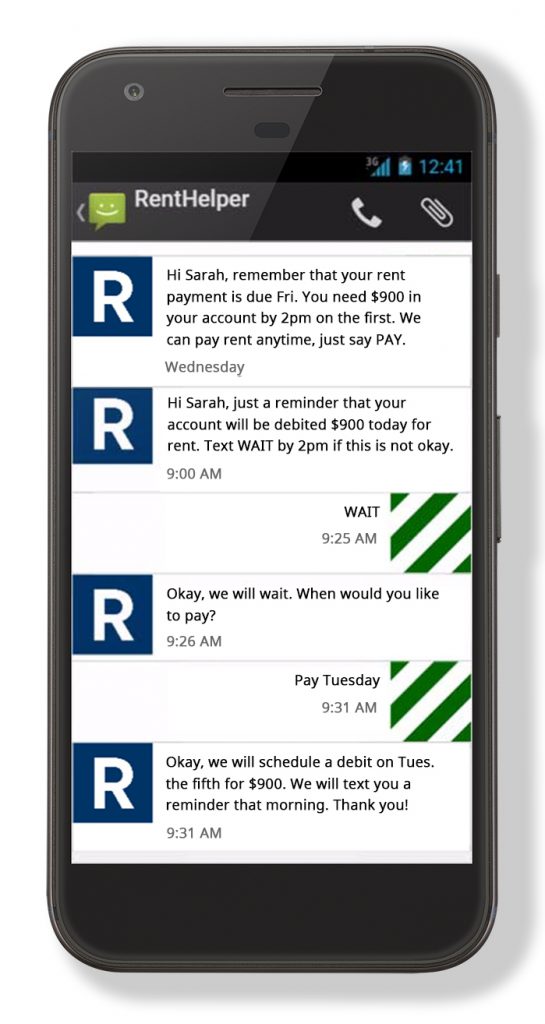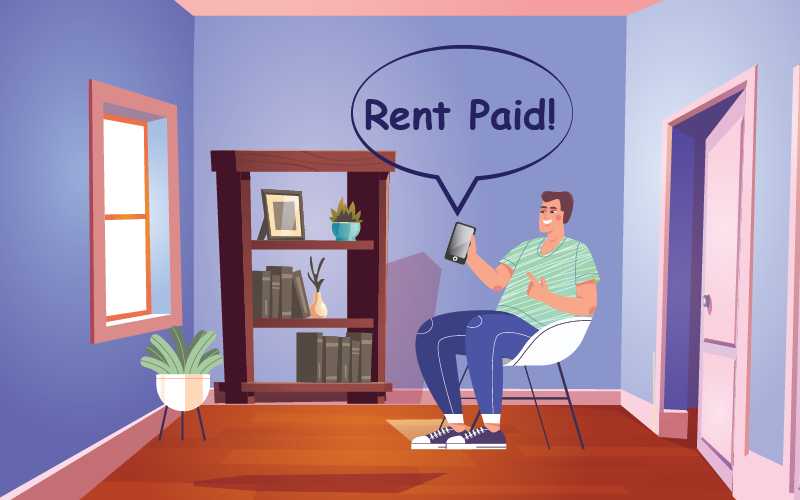How to Collect Rent on Time
| . Posted in News - 2 Comments
By Eric Weld, MassLandlords, Inc.
How to collect rent on time depends somewhat on landlords’ preferences and comfort with technology, and it may sometimes depend on your relationship with your tenants.
Collecting rent is, of course, a necessary aspect of the landlording job. It’s how landlords get paid and partly what funds upkeep and improvements on our rental properties.
But how to go about collecting rent from tenants, and how to do it most efficiently and on time, may vary from landlord to landlord.

RentHelper and some other rent collection platforms use text messages to communicate directly with renters, sending rent due reminders, late payment notifications, and responses to renters’ situations. (image: cc by-sa MockUPhone and RentHelper)
Tried and True Methods
Some landlords stick with the old-fashioned methods of asking tenants to write a check and then drop it in the mail, leave it in a previously agreed-upon place for pickup, or deposit it in an established bank account.
Others want to take the time to stop by their tenants’ homes in person, to maintain personal interaction or to use the occasion for a monthly once-over of the property to see how it’s being treated.
These 20th-century rent-collection methods may work fine for some landlords, especially those with one or only a few rentals, or with trusted long-term tenants.
The potential problem with these forms of rent collection is that they rely on tenants to pay rent on time, to be home and available at the time you agreed to stop by and to have the rent available when they’re scheduled to pay it. For landlords and property managers with numerous rentals, collecting and processing checks is an unnecessary time thief.
There are now more efficient, automated rent-collection options available that don’t require face-to-face contact or old-fashioned paper handling. In fact, once these processes are set up, they require very little effort or time on either landlords’ or tenants’ parts.

With today’s technologies, paying rent, for many landlords and tenants, has become either an automatic process or a simple matter for pressing a few buttons on their smart phone. Image: cc by-PS 4 MassLandlords.
Automated vs. Manual
One common way to collect rent these days is asking tenants to set up an online bill pay through which they transfer the rent amount on the due date to your bank account. This may be either through their bank or a separate money transfer program, like PayPal or Venmo.
PayPal and Venmo provide a very basic service, strictly moving money from one entity to another. For some landlords, that’s all that’s needed. And this is certainly an improvement on check-writing or in-person collection methods.
But this unsophisticated process still unnecessarily depends on tenants to voluntarily comply with rental due dates. When they fail to pay on time, it burdens landlords and managers nearly equally with check collection. They now have to spend time following up, applying and processing late fees, or sometimes tracking down an elusive tenant. All this extra work can create tension in the business relationship.
Smart Property Management
Far superior to these basic rent-collection methods are “smart” property management tools –fully automated options that issue reminders of upcoming rent due dates, notify you of late or missed payments, allow credit card or ACH payments and calculate and apply late charges when needed.
Smart management platforms are interactive with renters, landlords and property managers, and provide services based on information customized to a given rental situation.
There are numerous smart property management platforms, apps and companies available, depending on your range of needs. Some may only handle the rent-collection process for you. Others can provide comprehensive services such as maintaining and organizing records, issuing reports, coordinating maintenance requests, paying vendors, advertising and more, in addition to collecting rent.
These smart platforms also help protect landlords’ legal compliance by adhering to use and occupancy agreements during evictions and tenant transitions, for example, and by only accepting payments according to contracts on file.
RentHelper
One example of a smart property management tool is RentHelper.
MassLandlords piloted RentHelper in 2016 to assist its members in rent collection. RentHelper has since become its own entity and is available to MassLandlords members. (Disclosure: MassLandlords receives an affiliate commission equal to 9% of RentHelper service charges for the first year of use by a MassLandlords member.)
RentHelper is a highly interactive text messaging system that combines real-time communication with automated reminders and responses. Unlike some rent-collection platforms, RentHelper heavily engages with tenants, landlords and property managers via hundreds of text messages every month exchanging information about rental amounts, due dates, reminders of due dates, roommates, changes in occupancy and more.
For rent collection, RentHelper sets up an automatic debit from renters’ accounts on the due date, and deposits the rent into designated rent payment accounts set up by landlords and property managers.
Many Options to Choose From
There are many other options for online, automatic, “smart” rent collection and property management programs. Rich Merlino of Gwendolyn Property Management in Westborough, and a frequent presenter for MassLandlords, offers a few recommendations for automatic rent collection. Zelle (formerly PopMoney) is a money transfer app that allows transfers directly from bank account to bank account. Unlike PayPal or Venmo, Zelle does not require funds to pass through any administrative programs.
Merlino also recommends ClearNow, a leading rent payment program similar to RentHelper that debits rent payments from tenants’ bank accounts and deposits them directly into landlords’ and property managers’ accounts. Finally, Merlino suggests Buildium for housing providers who need full-service property management software, including rent collection.
Other rent payment services include PayRent and RentTrack. Property management programs with rent collection include Rentec Direct and Appfolio.
Whatever program you use, be sure to keep a rental ledger and check to make sure payments have been made, then record them in the ledger with data including the renter’s name, the amount, exact date of payment and whether or not it was on time.
What if Rent is Not Paid on Time?
In Massachusetts, rent is due on the date you and your tenant agreed it would be paid. After that date, rent is late. There is no grace period allowed.
In the event rent is not paid on time, you have legal options of serving a Notice to Quit or filing for eviction. Before doing so, however, we recommend that you try to talk with your tenant first to find out why rent hasn’t been paid.
In Massachusetts, terminally late rent payment can be considered as a reason to terminate a lease for cause.
But if a tenant is habitually late with rent, you could consider offering different payment options. It may work better for some tenants to pay bi-weekly, for example, or even weekly. Peter Haroutian, a Worcester landlord and longtime real estate investor, did this with his tenants (listen at approximately 7:30), who turned out to be among his favorite renters. If your tenant is paid on a Friday, for instance, you would debit their account on the Friday they receive payment before any other debits on the account. Finding a creative rent payment solution is almost always a better option than filing for eviction.
Landlords also have the legal option of charging late fees. However, in Massachusetts, you may not charge a late fee until rent is late by 30 days or more beyond the due date. (This is an unusually long late fee period in contrast with other states.) For instance, if rent is due on the first of the month (the most common setup), then the rent is late by one day on the second day of the month, by two days on the third day, etc.
Giving a discount for early rent payment is equivalent to charging a late fee, and is not legally allowed.
Costs of Rent Collection
Rent collection programs have varying fees, sometimes applied per transaction. Fees can range widely, depending on levels of service and the platform itself. RentHelper is able to keep charges very low because of its use of interactive text messaging; the platform charges 0.6% per transaction. Popmoney charges a flat fee of $.95 per transaction.
PayPal and Venmo require processing fees for each transaction (these platforms consider rental payments to be business transactions) – 1.9% for Venmo, 2.9% for PayPal. These fees can add up quickly with rent payments.
ClearNow becomes more financially beneficial with multiple debits. The charge for a single debit per month is $14.95, but only $2 per month for each additional debit. Buildium offers a free trial followed by subscription fees of $50, $160 or $460 per month depending on service level.
Price may be a consideration for some landlords, but many feel it’s worth the cost to save the time and effort that rent collection requires.
Choosing a rent collection program depends on specific needs, such as cost, time of payment processing and scope of services offered. Some landlords only need a simple fund transfer from the tenant’s bank account to their bank account. Others need broader management services that might include advertising, tenant screening, property inspections, rent collection and more.
The Future of Rent Collection
Collecting rent on time is easier than it once was, thanks to technology and the online, automatic options it makes possible. These online programs might not be for everybody and there will likely always be landlords who prefer paper payment and monthly contact with their tenants, which costs them nothing but time (and sometimes stress).
If you use a manual method, remain in contact with your tenants and remind them when rent due dates are approaching. Also invite them to notify you of any pending or potential cashflow problems to avoid their nonpayment from adversely affecting your accounts with overdrafts and associated fees.
Automatic rent collection programs are fast becoming the norm due to their low cost and undeniable convenience. They also provide added benefits for tenants, such as improving credit records and avoiding late fees with automatic reminders of rental due dates.
With so many automatic rent collection options available, the days of checking the mailbox or knocking on doors to collect a rent check are soon to be things of the past.





